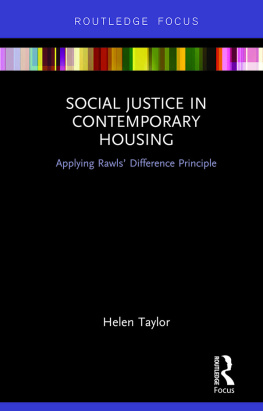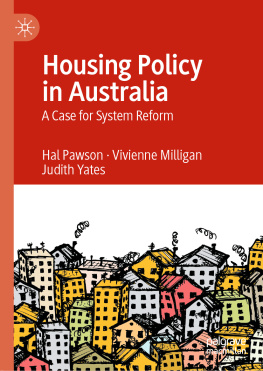1. Critical Background: Social Housing and Its Development During the Decades
Abstract
The topic of social housing and its practices is introduced and defined in the first chapter, according to its history in Europe and referring to different approaches and models developed. From the early developments of housing systems (beginning of nineteenth century), the chapter addresses the heyday of social housing in the post war (WWII) period. From the 1970s a general trend of withdrawal of the state from housing policies and social housing is recognized all over Europe. Social housing provision began to decrease and the sector opened up to economic pressures. These dynamics were studied by many scholars: in the 1990s a comparative approach was developed and became the main focus of numerous studies. Several aspects were analysed focusing especially on: housing systems and their relations with welfare regimes, neo-liberal reforms. Three perspectives were identified (juxtapositional, convergence, and divergence) and it is possible to recognize these different approaches in the various researches of a number of scholars. In the last part of the chapter the author focuses on the impacts of the world financial crisis (20072008), the characteristics of the current social housing and housing systems, considering particularly the context of Southern Europe and Italy.
1.1 Social Housing: Which Definition in the European Area?
Social housing is considered a tricky concept in literature. According to national and international studies and policies, the scientific community in all the European countries acknowledges the lack of a common definition. Europe is the spatial scale considered in this chapter, and the diverse meanings of social housing are due to the wide diversity of national housing systems, concepts and policies.
At a European level there is no common policy or general strategy. The European Union has no jurisdiction on housing, and there are no calls for projects or programmes that directly finance this sector. Nevertheless, European programmes acknowledge the importance of social housing and they promote strategies for urban renewal and regeneration, energy efficiency and social inclusion, exchange of good practices and networks centred on these topics. European funds can be filtered out to social housing also through programmes with a focus on care of the elderly, on people with disabilities, and on the use of efficient and clean energies. There is also a link with social services, since social housing is a facility for the public. A reference to social housing can be found in a recent EU tool designed to tackle the financial crisis, namely the European Fund for Strategic Investments (EFSI) (Pittini et al.
Social housing is managed by national states. Each country has its own national strategies and local plans that define the national housing systems. Despite the uniqueness of each country and their different institutional frameworks, similarities can be found in the allocation of responsibilities for providing social housing between state, private sector, voluntary organisations and households. Historically, social housing in Europe was a response to the emerging housing needs in the early nineteenth century. Industrialisation and urbanisation were trigger phenomena. The private sector, associations and enterprises promoted the first housing initiatives but many national states across Europe took over them, generalising actions and interventions to a wider scale.
Nowadays, the European context includes a combination of rental housing stock (owned generally by public actors) and a range of providerssuch as voluntary, public or private associations, foundations, cooperatives and investors. This is what could be defined as social housing. Various forms of organisations provide housing, and elected local authoritiesthe public sectorare only one of them. The general concept is related to social rental housing but in some countries the provision of housing also includes the promotion of home ownership.
The diversity across European countries concerns size of the social housing sector (share of this stock, compared to the total amount of each country), legal and organisational forms, types of social tenures, and the housing policy framework within which social housing operates. Housing is a public responsibility but the majority of European countries have a target for their social housing. The allocation criteria can be used to distinguish countries with a specific social housing target and others where the universalistic approach is predominant (Table ). These differences are related to national policies; hence, the classification can also change according to variations in national priorities. For instance, the financial crisis could have reformed some of the orientations in social housing of EU states. The classification presented in the table below (1) does not reflect the on-going processes and cross-cutting trends but the traditional approach in the respective countries.
Table 1.1
Traditional approaches to social housing provision in European countries
Allocation criteria |
|---|
Size of the social housing sector (%) | Universalistic | Targeted |
|---|
Working class or employees | Most vulnerable |
|---|
| Sweden The Netherlands Austria Denmark | Austria Poland | United Kingdom |
1119 | Finland | Czech Republic Finland France | France |
<10 | Belgium Germany Greece Italy Luxemburg | Belgium Estonia Germany Hungary Ireland Portugal Spain |
Source CECODHAS European Social Housing Observatory (2007, p. 11)
A complete review about social housing and its main features in EU countries could be found in the publications of Housing Europe/CECODHAS, and this topic is fully analysed in scientific literature.). Housing Europe is the European Federation of Public, Cooperative and Social Housing, (former CECODHASEuropean Liaison Committee on Social Housing), a European network, established in 1988 after the first meeting of all European housing ministers to promote the right to decent housing for all. It represents public, voluntary and cooperative social housing enterprises. This organisation defined an operational statement of social housing:
CECODHAS considers that the primary role of social housing is to help households with problems in gaining access to decent housing on the market to find accommodation in an adequate social and urban mix. The common feature of social housing in the member states is the existence of rules for allocating housing to benefiting households. Defining these rules for allocating housing is the responsibility of the member states and their public authorities. They are aimed at overcoming the problems of the system of allocating housing through the free working of the market, problems that result from a structural deficit of decent and affordable housing. (Czischke , p. 64)












